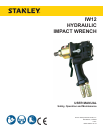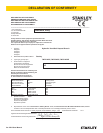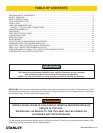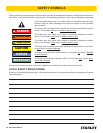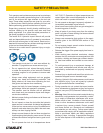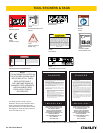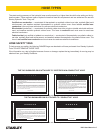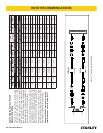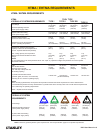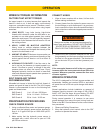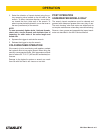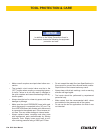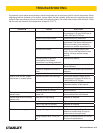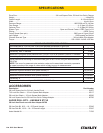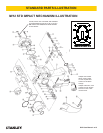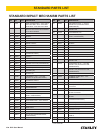
IW12 User Manual ◄ 5
Tool operators and maintenance personnel must always
comply with the safety precautions given in this manual
and on the stickers and tags attached to the tool and
hose. These safety precautions are given for your safe-
ty. Review them carefully before operating the tool and
before performing general maintenance or repairs.
Supervising personnel should develop additional pre-
cautions relating to the specic work area and local
safety regulations. If so, place the added precautions in
the space provided on in this manual.
The model IW12 Hydraulic Impact Wrench will provide
safe and dependable service if operated in accordance
with the instructions given in this manual. Read and un-
derstand this manual and any stickers and tags attached
to the tool and hose before operation.
Failure to do so could result in personal injury or equip-
ment damage.
• The operator must start in a work area without by-
standers. Flying debris can cause serious injury.
• Do not operate the tool unless thoroughly trained
or under the supervision of an instructor. Establish
a training program for all operators to ensure safe
operation.
• Always wear safety equipment such as goggles,
gloves, ear, head and breathing protection, and
safety shoes at all times when operating the tool.
Use gloves and aprons when necessary.
• Inspect tool daily for loose fasteners, missing parts
and leakage. Have tool repaired if necessary.
• The operator must be familiar with all prohibited
work areas such as excessive slopes and danger-
ous terrain conditions.
• Maintain proper footing and balance at all times and
do not overreach.
• Do not inspect or clean the tool while the hydraulic
power source is connected. Accidental engagement
of the tool can cause serious injury. Be observant of
hydraulic and water hose lying about the work area,
as they can be a tripping hazard.
• Always connect hoses to the tool hose couplers be-
fore energizing the hydraulic power source. Be sure
all hose connections are tight and are in good condi-
tion.
• Do not operate the tool at oil temperatures above
140 °F/60 °C. Operation at higher temperatures can
cause higher than normal temperatures at the tool
which can result in operator discomfort.
• Do not operate a damaged, improperly adjusted, or
incompletely assembled impact wrench.
• Never wear loose clothing that can get entangled in
the working parts of the tool.
• Keep all parts of your body away from the rotating
parts. Long hair or loose clothing can become drawn
into rotating components.
• Always use accessories that conform to the speci-
cations given in the OPERATION section of this
manual.
• Do not reverse impact wrench rotation direction by
changing uid ow direction.
• Release the trigger if the power supply has been in-
terrupted.
• When working near electrical conductors, always
assume that all conductors are energized and that
insulation, clothing and hoses can conduct electric-
ity. Use hose labeled and certied as non-conduc-
tive.
• To avoid personal injury or equipment damage, all
tool repair, maintenance and service must only be
performed by authorized and properly trained per-
sonnel.
• Serious injury or death could result from a tool or ac-
cessories dropped from an elevated height.
• Warning: Hydraulic uid under pressure could cause
skin injection injury. If you are injured by hydraulic
uid, get medical attention immediately.
• During operation do not contact the impact mecha-
nism, accessories or hardware as they can become
very hot; use your (PPE) Personal Protection Equip-
ment.
• Warning: Use of this tool on certain materials during
demolition could generate dust potentially contain-
ing a variety of hazardous substances such as as-
bestos, silica or lead. Inhalation of dust containing
these or other hazardous substances could result
in serious injury, cancer or death. Protect yourself
and those around you. Research and understand
the materials you are cutting. Follow correct safety
procedures and comply with all applicable national,
state or provisional health and safety regulations
relating to them, including, if appropriate arranging
for the safe disposal of the materials by a qualied
person.
SAFETY PRECAUTIONS



